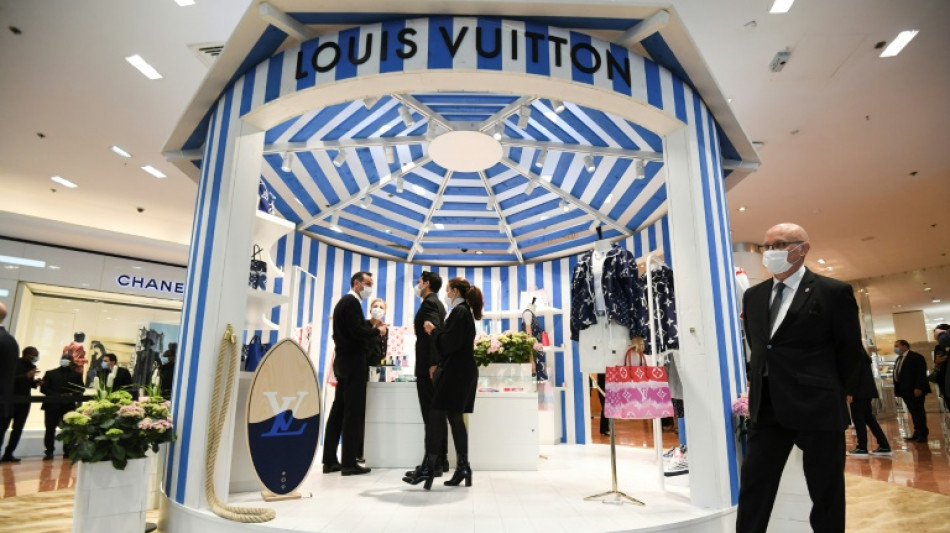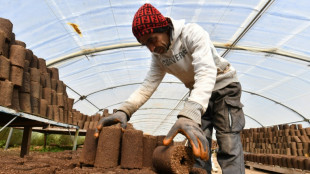
-
 French court hands Le Pen five-year election ban
French court hands Le Pen five-year election ban
-
Probe accuses ex J-pop star Nakai of sexual assault

-
 Japan leads hefty global stock market losses on tariff woes
Japan leads hefty global stock market losses on tariff woes
-
Saka 'ready to go' after long injury lay-off: Arteta

-
 Ingebrigtsen Sr, on trial for abusing Olympic champion, says he was 'overly protective'
Ingebrigtsen Sr, on trial for abusing Olympic champion, says he was 'overly protective'
-
Tourists and locals enjoy 'ephemeral' Tokyo cherry blossoms

-
 Khamenei warns of 'strong' response if Iran attacked
Khamenei warns of 'strong' response if Iran attacked
-
France fines Apple 150 million euros over privacy feature

-
 UK PM urges nations to smash migrant smuggling gangs 'once and for all'
UK PM urges nations to smash migrant smuggling gangs 'once and for all'
-
Thai authorities probe collapse at quake-hit construction site

-
 France's Le Pen convicted in fake jobs trial
France's Le Pen convicted in fake jobs trial
-
Chinese tech giant Huawei says profits fell 28% last year

-
 Trump says confident of TikTok deal before deadline
Trump says confident of TikTok deal before deadline
-
Myanmar declares week of mourning as hopes fade for quake survivors

-
 Japan's Nikkei leads hefty market losses, gold hits record
Japan's Nikkei leads hefty market losses, gold hits record
-
Tears in Taiwan for relatives hit by Myanmar quake

-
 Venezuela says US revoked transnational oil, gas company licenses
Venezuela says US revoked transnational oil, gas company licenses
-
'Devastated': Relatives await news from Bangkok building collapse

-
 Arsenal, Tottenham to play pre-season North London derby in Hong Kong
Arsenal, Tottenham to play pre-season North London derby in Hong Kong
-
Japan's Nikkei leads hefty equity market losses; gold hits record

-
 Israel's Netanyahu picks new security chief, defying legal challenge
Israel's Netanyahu picks new security chief, defying legal challenge
-
Trump says US tariffs to hit 'all countries'

-
 Prayers and tears for Eid in quake-hit Mandalay
Prayers and tears for Eid in quake-hit Mandalay
-
After flops, movie industry targets fresh start at CinemaCon

-
 Tsunoda targets podium finish in Japan after 'unreal' Red Bull move
Tsunoda targets podium finish in Japan after 'unreal' Red Bull move
-
French chefs await new Michelin guide

-
 UK imposes travel permit on Europeans from Wednesday
UK imposes travel permit on Europeans from Wednesday
-
At his academy, Romanian legend Hagi shapes future champions

-
 Referee's lunch break saved Miami winner Mensik from early exit
Referee's lunch break saved Miami winner Mensik from early exit
-
Djokovic refuses to discuss eye ailment after shock Miami loss

-
 Mitchell magic as Cavs bag 60th win, Pistons and T'Wolves brawl
Mitchell magic as Cavs bag 60th win, Pistons and T'Wolves brawl
-
Mensik shocks Djokovic to win Miami Open

-
 Duterte lawyer: 'compelling' grounds to throw case out
Duterte lawyer: 'compelling' grounds to throw case out
-
What happens on Trump's 'Liberation Day' and beyond?

-
 Clock ticks on Trump's reciprocal tariffs as countries seek reprieve
Clock ticks on Trump's reciprocal tariffs as countries seek reprieve
-
Japan-Australia flagship hydrogen project stumbles

-
 Musk deploys wealth in bid to swing Wisconsin court vote
Musk deploys wealth in bid to swing Wisconsin court vote
-
Mensik upsets Djokovic to win Miami Open

-
 China manufacturing activity grows at highest rate in a year
China manufacturing activity grows at highest rate in a year
-
'Waited for death': Ex-detainees recount horrors of Sudan's RSF prisons

-
 Japan's Nikkei leads big losses in Asian markets as gold hits record
Japan's Nikkei leads big losses in Asian markets as gold hits record
-
Rescue hopes fading three days after deadly Myanmar quake

-
 'Basketbrawl' as seven ejected in Pistons-Wolves clash
'Basketbrawl' as seven ejected in Pistons-Wolves clash
-
Four men loom large in Microsoft history

-
 Computer pioneer Microsoft turns 50 in the age of AI
Computer pioneer Microsoft turns 50 in the age of AI
-
Trump calls out both Putin and Zelensky over ceasefire talks

-
 Kim Hyo-joo tops Vu in playoff to win LPGA Ford Championship
Kim Hyo-joo tops Vu in playoff to win LPGA Ford Championship
-
Economy and especially Trump: Canadians' thoughts on campaigns

-
 Liberal PM Carney takes lead four weeks before Canada vote
Liberal PM Carney takes lead four weeks before Canada vote
-
SpaceX to launch private astronauts on first crewed polar orbit


French luxury houses give unsold goods a second chance
In the extravagant world of the French luxury industry, brands used to prefer destroying their unsold goods rather than offering their high-priced products at a discount.
But gone are the days of binning the coats, handbags and shoes pooh-poohed by shoppers after a new anti-waste law came into force at the start of the year.
Now luxury houses are managing their stocks more carefully, offering deals to staff, making donations and recycling goods.
"It's a subject that has become important today," said Julie El Ghouzzi, a luxury goods expert at the Cultz consulting agency.
She pointed to the scandal that engulfed Burberry in 2018 after the British luxury brand disclosed that it had destroyed 28 million pounds ($38 million, 34 million euros at current exchange rates) of unsold goods in 2017 -- the equivalent of 20,000 of its trench coats.
Following the firestorm the revelation triggered, Burberry announced it would halt the practice from the following year.
Markdowns to move goods are not an option in the luxury business as lower prices can undermine the attractiveness of their labels, which thrive on their elite status.
"In the luxury sector, if the price tag is lower, so is the desire to buy it," said El Ghouzzi.
- Mentalities have changed -
Luxury houses are paying more attention to the subject now, said Arnaud Cadart, a portfolio manager at Paris-based asset manager Flornoy.
"Mentalities have changed, we're no longer in an economy that values unbridled creation above all else," he said.
Also gone is the mentality that "if it doesn't work we'll destroy it," said Cadart.
Now luxury houses strive to fine-tune their stocks.
The Kering group, which owns the Gucci, Saint Laurent, and Balenciaga labels among others, has invested in artificial intelligence in order to better manage its stock.
At its competitor LVMH, the world's largest luxury group that includes Louis Vuitton, Dior, and Celine among many others, environmental development director Helene Valade said "the luxury business model is closely adjusted to demand" with low levels of stock being held by the firms.
Nevertheless, she acknowledged that the new law will push luxury houses to learn even more about their clients to better anticipate their purchases and thus reduce stocks to a minimum.
El Ghouzzi said Louis Vuitton is already quite good at keeping track of its stock.
"They know exactly what they have in stock and are capable of managing it down to the millimeter," she said, adding "that's not the case in many other houses."
When there are nevertheless unsold goods, selling them to staff at advantageous prices is one option. These large fashion groups have large staffs, with more than 150,000 employees at LVMH, 38,000 at Kering and 16,600 at Hermes.
Gifts to associations is another option.
LVMH has a partnership with Cravate Solidaire, an association that collects donations of professional clothing and provides it to people with disadvantaged backgrounds trying to land jobs.
- Upcycling -
Designers have also begun to make use of discarded or leftover materials, a practice often called upcycling.
"Previously, a designer with a brilliant idea would go search for materials to realise their idea," LVMH's Valade told AFP.
"Today, the process is sometimes the reverse: there are certain designers who start with the materials at hand -- old collections, unused fabric hanging about, leftover bits of leather... and it inspires them," she said.
This was the case for late American designer Virgil Abloh, who was the artistic director of Louis Vuitton's menswear collection from 2018 until his death in 2021.
Marc Jacobs in New York works with Fabscrap, which recycles unused fabric to create insulation or products like furniture lining, or donates it to students and artists to use for their creations.
LVMH also has a partnership with WeTurn, which collects unsold clothing and material to recycle it into new thread and fabric.
Hermes said that in 2020 it sold 39,000 upcycled products.
"The activities which destroy the most are fashion, leather goods and cosmetics," said portfolio manager Cadart.
Given the efforts undertaken and the current economic conditions, items are more often out of stock than lying about unsold.
"Since 2014, Hermes has thrown out almost nothing, everything flies off the shelves," Cadart added.
At LVMH, Valade said, "leather goods are, at the moment, in more of a situation of being out of stock" than not being sold.
She pointed to an upcycled Loewe bag made from scrap leather cuttings that sells for 1,700 euros and which is currently out of stock.
G.Stevens--AMWN

